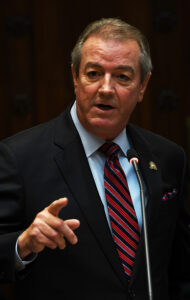(Getty Images)
FRANKFORT — The GOP speaker of the Kentucky House of Representatives says he expects House Republicans’ two-year budget proposal to utilize some of the state’s record “rainy day” fund balance, though he declined to say how much or for what.??
House Speaker David Osborne, R-Prospect, in a Tuesday afternoon press conference said crafting the statutorily-mandated two-year state budget would be his caucus’ top priority in this year’s legislative session. He said he expects the budget bill to be filed next week.?

“We will continue to be very, very pragmatic and very fiscally conservative in our budget, but also understanding that there are places that we can and should invest,” Osborne said.?
Osborne said he believes the budget will include “significant” expenditures from the state’s budget reserve trust fund, also known as the “rainy day” fund, which has reached a record more than $3.7 billion in the past fiscal year.?
Besides paying down the state’s liabilities in its retirement systems, Osborne said little about how the “rainy day” fund expenditures would be used.?
“We will end this fiscal year with four-and-a-half-plus billion dollars in the budget reserve. That’s more than we need. And so it is practical that we get rid of some of that money,” Osborne said.?
Democratic Kentucky Gov. Andy Beshear’s $136.6 billion spending plan, which he unveiled weeks before governors normally introduce their budgets, doesn’t use any rainy day funds. Beshear said in a press conference last month his budget proposal is the “largest budget that we’ve seen in history” without the use of rainy day funds, though he said he would support using some of the excess funds.?
Osborne said while he hasn’t seen Beshear’s spending plan detailed in an “actual budget document,” the two sides have “many shared goals.”?
Osborne’s comments on the first day of this year’s legislative session come as advocates from various groups are calling for significant investments from the state’s rainy day fund to go toward a variety of needs including affordable housing, recovery from natural disasters, education and more.?
Natalie Cunningham, the outreach director for the research group Kentucky Center for Economic Policy (KYCEP), in a Tuesday morning press conference said “there’s no good reason” to let the rainy day fund grow “while the needs of so many Kentuckians go unmet.”

“For too long, we’ve heard many, many times that we just don’t have the money to meet the needs, and again for the first time, we know that that excuse is no longer valid,” Cunningham said.
The only reason to stockpile more funds into the budget reserve trust fund, she said, is to support further cuts to the state’s income tax, a goal of Republican lawmakers. It’s something KYCEP and other groups have strongly opposed, arguing that cutting the income tax would deplete the state’s tax revenues that could be needed during a future economic downturn.
Republican lawmakers passed a landmark tax reform bill in 2022, which set up fiscal prerequisites before lawmakers can lower the state’s income tax rate by a half percentage point. Having the state’s “rainy day” fund be at least 10% of total general fund revenues from the prior fiscal year is one of the r prerequisites.?
Andrea Zang, a tenant organizer in Lexington, said she’s often struggled to afford rent, even while working various service industry jobs, and that other tenants are in the same situation.
The state had an affordable housing shortage, even before natural disasters destroyed housing stock in rural parts of the state. The National Low Income Housing Coalition estimates Kentucky lacks more than 89,000 affordable and available rental housing units in the state to meet current housing demands.?
“I don’t think it can get much clearer that housing has to be available to people sooner than later,” she said. “I want to stress: we know that we have the money to do this. There are billions of dollars in the rainy day fund available right now.”?

GET THE MORNING HEADLINES.